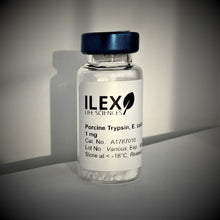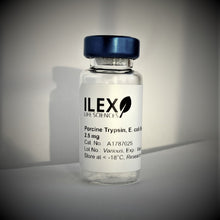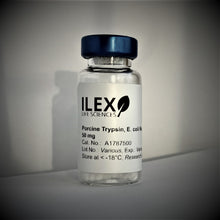Description
Our bioactive, Recombinant Porcine Trypsin, lyophilized powder is an enzyme recombinantly expressed in E. coli and purified by standard chromatography techniques.
Application
Recombinant Porcine Trypsin is used for dissociation of adhesion-dependent cells, and thus may be used to release adherent cells from tissue culture plates for passaging. This animal-free product eliminates the introduction of animal source contaminants found in traditional bovine and porcine trypsin enzymes.
For trypsin digestion, the suggested ratio is 1:50 to 1:1000 (w/w).
CAS Registry No.
9002-07-7
Source
Recombinantly produced in E. coli.
Formulation
Sterile-filtered lyophilized powder. The enzyme was lyophilized with mannitol as preservative.
Reconstitution
It is recommended to reconstitute the lyophilized Recombinant Porcine Trypsin in sterile 1mM HCl or 50mM HAC not less than 100 µg/ml, which can then be further diluted to other aqueous solutions.
Biological Activity
4500 USP units/mg protein.
One USP unit of trypsin activity will produce a Delta A253 of 0.003 per minute in a reaction volume of 3.0 ml at pH 7.6 and 25°C, with BAEE as a substrate (1 cm light path).
Amino Acid Sequence
VGGYTCAANSIPYQVSLNSGSHFCGGSLINSQWVVSAAHCYKSRIQVRLGEHNI
DVLEGNEQFINAAKIITHPNFNGNTLDNDIMLIKLSSPATLNSRVATVSLPRSCA
AAGTECLISGWGNTKSSGSSYPSLLQCLKAPVLSDSSCKSSYPGQITGNMICVGF
LEGGKDSCQGDSGGPVVCNGQLQGIVSWGYGCAQKNKPGVYTKVCNYVNWI
QQTIAAN
Shipping & Storage
Ships at ambient temperature. Upon receipt, store the product at the temperature recommended below:
Recombinant Porcine Trypsin, although stable at room temperature for 1 week, should be stored desiccated below -18°C. For long term storage it is recommended to add a carrier protein (0.1% HSA or BSA). Please prevent freeze-thaw cycles.
Application Note
Cell exposure to trypsin solution should be as brief as possible. Overexposure to trypsin can damage cells. Cell cultures under serum-free conditions in general detach more readily and are more sensitive to trypsin. Failure to neutralize trypsin may result in a loss of the culture.
Serum contains natural trypsin inhibitors. In serum-free cell culture the neutralizing effect of serum is absent. Therefore, it is crucial to completely block proteolytic activity from trypsin after detachment of the cells. For inhibiting trypsin activity in serum-free culture of adherent cells, we recommend using PAN-Biotech Trypsin Inhibitor III.
Background
Trypsin is a serine protease that hydrolyses proteins, it is found in the digestive system of numerous vertebrates. Trypsin is produced as the inactive proenzyme trypsinogen in the pancreas. Trypsin cleaves peptide chains at the carboxyl side of the amino acids lysine and arginine, except when either is followed by proline. Trypsin is secreted into the duodenum, where it acts to hydrolyses peptides into amino acids, which is necessary for the uptake of protein in the food even though peptides are smaller than proteins; they are still too big to be absorbed through the lining of the ileum. The optimal operating pH for Trypsins is about 8 and about 37°C temperature. In cystic fibrosis disease there is a deficiency in transport of trypsin and other digestive enzymes from the pancreas.






